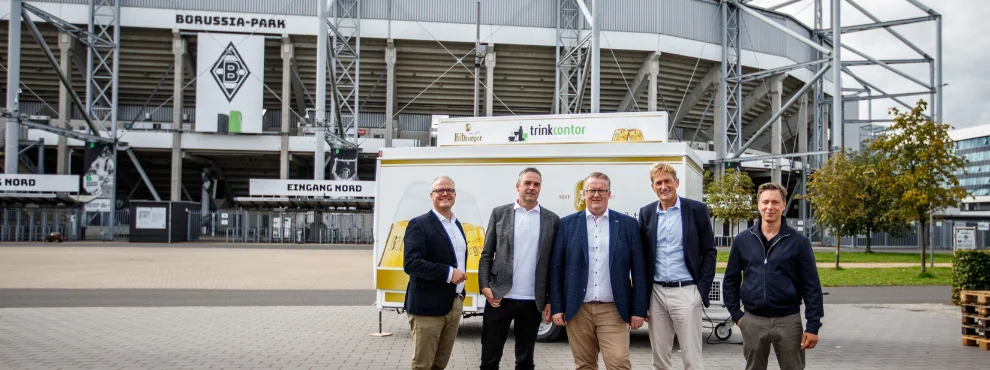Doing business more sustainably together
Sustainable beer value chain: from hops to beer enjoyment in the football stadium

Five companies along the beer value chain are now demonstrating that everyone can benefit from committed sustainability activities: from hop farmer Andreas Dick to the Bitburger brewery, Leiber GmbH as a refiner of brewer's yeast and the drinks wholesaler Trinkkontor to the Bundesliga football club Borussia Mönchengladbach. All companies are already operating more sustainably and are certified according to the first holistic sustainability standard of the Centre for Sustainable Leadership (ZNU).
"The certification of these companies is an example of how sustainability can be jointly implemented and further developed along the value chain," say the founders and directors of the ZNU, Dr Axel Kölle and Dr Christian Geßner.
More and more companies are trying to fulfil the requirements of retailers, banks, employees, consumers and legislation and transform their business in the direction of sustainability. More than 100 companies have now succeeded in making this organisational change with the help of implementation and external certification in accordance with the ZNU Standard for Sustainable Business Practices. It supports SMEs in particular in identifying, structuring and managing the relevant issues.
Every company can become more sustainable
Dr Axel Kölle emphasises: "It is important for us to stress that every company can become more sustainable. The ZNU standard succeeds in making sustainability holistically tangible and measurable, facilitating implementation and triggering a positive learning and development dynamic. At its core, the standard aims to transform the economy and stands for participation. We are delighted to be able to write such a success story along the beer value chain with these five companies."
The beer value chain begins in the Eifel region, with hop farmer Andreas Dick in Holsthum. He supplies his hops exclusively to the Bitburger brewery. The close, trusting partnership has existed for almost six decades. The Bitburger brewery trainees also learn from Andreas Dick what needs to be considered when growing and harvesting hops and to what extent climate and soil play a role in hop cultivation. Bitburger also supported the hop farmer in rebuilding his hop gardens after the flood disaster in 2021 and in various biodiversity measures.
Sustainability as an opportunity and potential for continuous improvement
The processed hops from Holsthum are used for brewing at Bitburger after the quality standards have been checked. The manufacture of the products is climate-neutral. Here, the company focuses on avoiding and reducing CO2 emissions and using green electricity. Currently unavoidable emissions are offset by recognised compensation projects. Bitburger is also involved in promoting biodiversity measures and more sustainable packaging.
"For our family business, sustainability is a matter of course," says Jan Niewodniczanski, Managing Director Technology and Environment and representative of the seventh generation of the family. "We value the ZNU standard as a management system. For example, it requires intensive dialogue with stakeholder groups and engagement with the topic of sustainability along the entire value chain."
Strategic work thanks to ZNU certification
The beverage wholesaler Trinkkontor is responsible for logistics from Bitburg to the catering trade. Thomas Nuhn is responsible for sales and sustainability within the company. He also supplies the Borussia Mönchengladbach stadium. "Since our ZNU certification in March of this year, we have been working much more strategically on all sustainability issues relevant to us. This is also greatly appreciated by our employees, who are happy to break new ground. In particular, we have further improved our collaboration with Borussia Mönchengladbach through this cooperation. In regular discussions and dialogue at eye level, we analyse our actions and are constantly improving in the areas of delivery reliability, the provision of bar vehicles and equipment and our main product, Bitburger Pils."
Borussia Mönchengladbach is also certified in accordance with the ZNU Standard for Sustainable Business Practices. During the examination, not only energy consumption and CO2 emissions were scrutinised, but also the range of products on offer at the stadium kiosks. "The regional selection of suppliers is crucial for us in order to credibly communicate the topic of sustainability to our employees, fans and partners," says Borussia Managing Director Markus Aretz. In addition to the product, the bar should of course also be as sustainable as possible. "We are committed to Bitburger because we share the same values and work in partnership to find more sustainable solutions." Reusable cups have therefore been used for many years and the cup holders, which are particularly popular with thirsty fans, are made from recycled paper.
Optimising processes to conserve resources and the environment
Another company is sustainably involved in this chain: Leiber refines brewer's yeast into innovative products for humans and animals. Tailor-made product solutions for healthy nutrition, biotechnological and agricultural applications are developed in the company's own laboratories. Here, a large proportion of the yeast from the Bitburger brewery is given a new lease of life through upcycling.
"With optimised processes, we can efficiently use the raw material brewer's yeast from the extract to the beta-glucan in the cell wall and avoid committees. This saves resources and protects the environment," says Dietmar Vahle, Head of Quality Management and Sustainability Manager at Leiber. He adds: "With the ZNU certification, Leiber is contributing to transparent supply chains: both for the breweries from which we source the brewer's yeast and for the companies in the food industry and animal nutrition sector to which we supply products."
All partners want to further expand their sustainable collaboration along the value chain in the future and initiate new, joint projects. This is all the easier as they all have a common understanding of systematic, measurable sustainability based on the ZNU standard.
For Christian Geßner and Axel Kölle, this is just the beginning: "We want to support even more value chains in becoming more sustainable together in the future."
Photos for download
Contact person

Svenja Malessa
Press Officer
Administration | Communication & Marketing
Alfred-Herrhausen-Straße 48
58455 Witten
Room number: 2.F05
